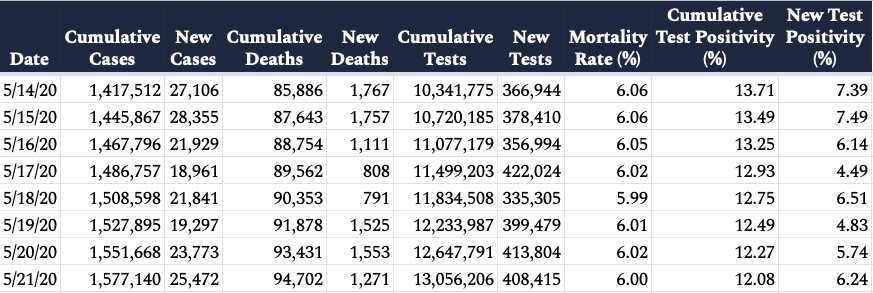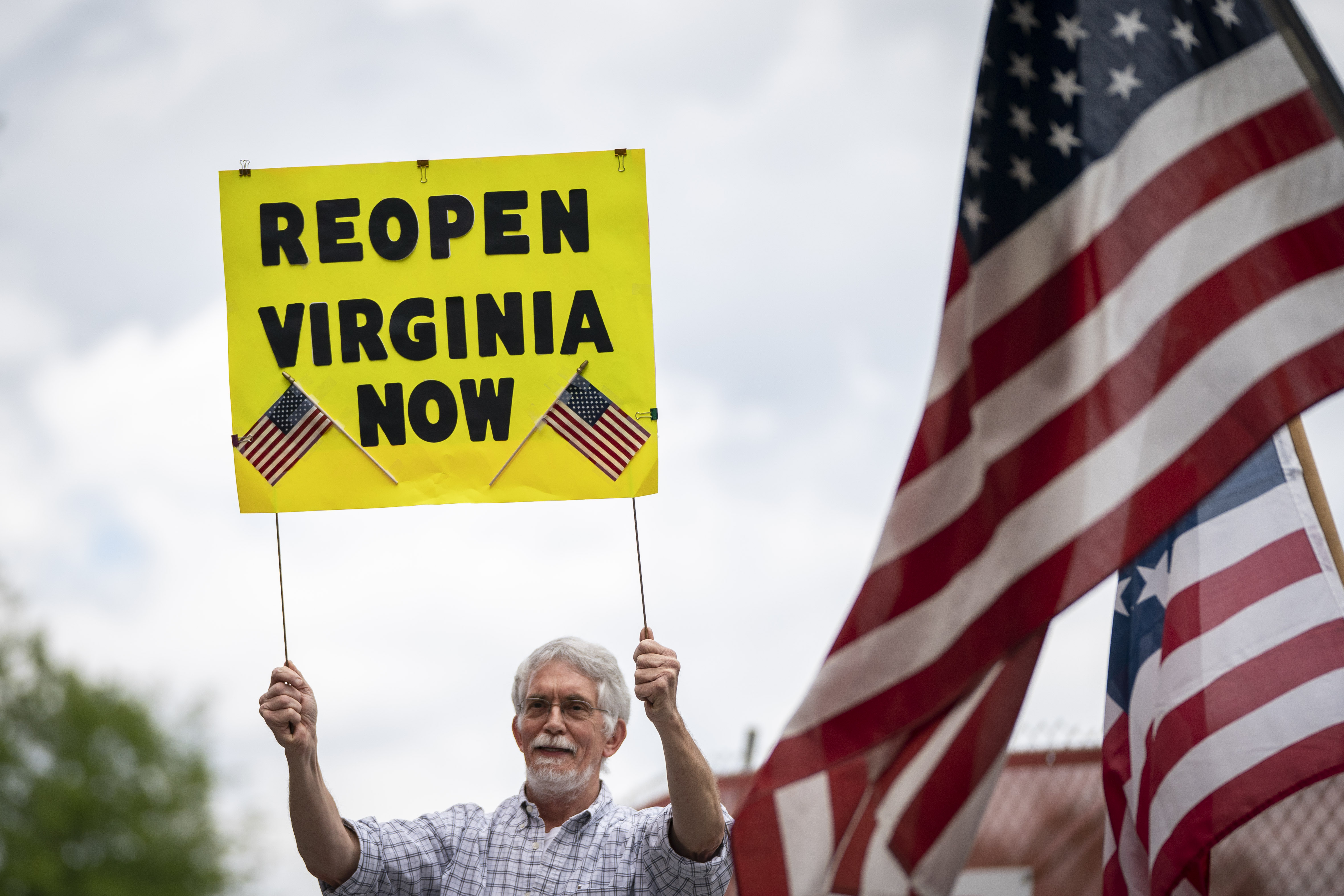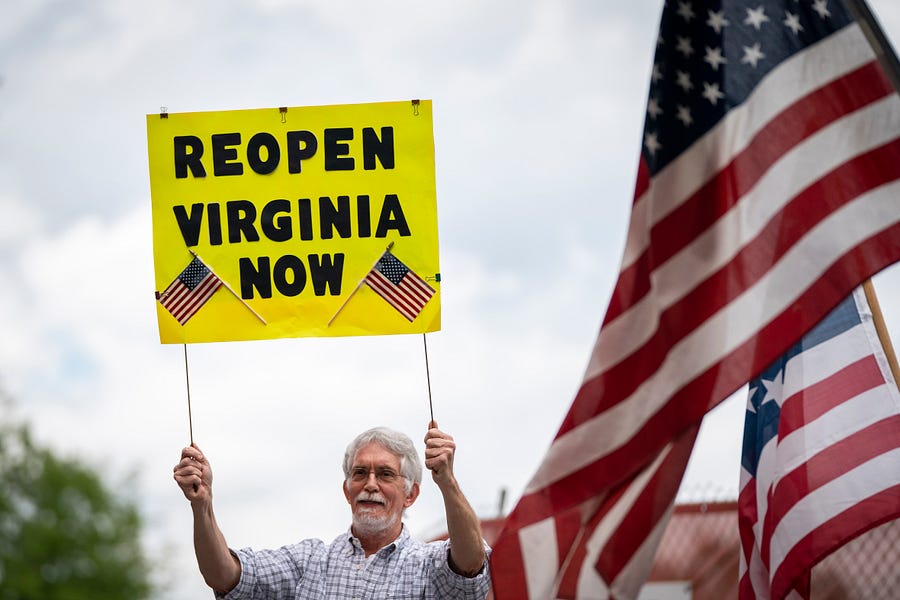Happy Friday! A huge thanks to the hundreds of you who joined us last night for our second Dispatch Live event—we had a blast! If you missed it, don’t fret: Members will be getting a link to the video later today.
A quick programming note: There will be no Morning Dispatch on Memorial Day. We hope you enjoy the long weekend as best you can, and we’ll see you right back here bright and early on Tuesday morning.
Quick Hits: Today’s Top Stories
-
As of Thursday night, 1,577,140 cases of COVID-19 have been reported in the United States (an increase of 25,472 from yesterday) and 94,702 deaths have been attributed to the virus (an increase of 1,271 from yesterday), according to the Johns Hopkins University COVID-19 Dashboard, leading to a mortality rate among confirmed cases of 6 percent (the true mortality rate is likely lower, but it’s impossible to determine precisely due to incomplete testing regimens). Of 13,056,206 coronavirus tests conducted in the United States (408,415 conducted since yesterday), 12.1 percent have come back positive. (NOTE: The Atlantic reported yesterday that the Centers for Disease Control is “combining test results that diagnose current coronavirus infections with test results that measure whether someone has ever had the virus,” thus “overstating the country’s ability to test people who are sick with COVID-19.” We will continue including the Johns Hopkins University data, but take the recent increase in testing figures and decline in test positivity with a grain of salt.)


-
Another 2.4 million Americans filed unemployment claims last week, bringing the total for the past nine to 38.6 million. The $600 weekly unemployment boost provided by the CARES Act is set to expire at the end of July, with President Trump making clear to Republican senators this week he opposed an extension of the program.
-
President Trump announced Thursday that the United States is withdrawing from the Open Skies Treaty—a 1992 agreement that allows member countries to enter each others’ airspace unarmed to monitor potential military activity—due to Russia’s repeated violations of the terms.
-
China is moving toward clamping down on Hong Kong again. A proposed national security law would tighten the mainland’s grip over Hong Kong, banning sedition, treason, and secession. “Beijing’s current proposal will effectively destroy the rule of law in Hong Kong and will give Chairman Xi’s thugs legal cover to treat freedom-loving protesters as terrorists,” Sen. Ben Sasse said in a statement.
The Great Sort, Continued

An analysis by Reuters has found that coronavirus death rates in Democratic areas are triple those in Republican ones. Looking specifically at counties that voted for Hillary Clinton in the 2016 presidential election, the report found 39 coronavirus deaths per 100,000 residents but only 13 of every 100,000 in counties that voted for Donald Trump.
Of course, the counties that make up New York City skew the results and reflect the larger urban and rural political divide that holds true across much of the country. But the report also found that, even in a state like Kansas, “the death rate is seven times higher in the two counties that backed Clinton than in the rest of the state.” Although there were notable exceptions like Texas and Nebraska, the higher Democratic death toll held true at the county level in 36 of the 50 states.
This blue and red disparity in reported COVID-19 deaths is bound to have political implications ahead of November.
First, effects of the virus may affect—literally—how people vote. Ahead of Pennsylvania’s June primary, Democratic voters have requested 1,005,092 absentee ballot applications compared with just 428,023 Republicans ballot requests. In theory, a partisan divide as to whether people are more likely to vote by mail or in person shouldn’t have an enormous effect on the final results, but it can also be one of the first tangible indications of a growing enthusiasm gap in swing states like Pennsylvania. Republican officials in that state are already sounding the alarm, “laboring to make GOP voters comfortable with absentee voting, especially because the pandemic may reduce the availability of physical polling places.”
Second, the disparity in how the virus is affecting different partisan groups will affect how they view the next steps. In a release last night, a Politico-Harvard T.H. Chan School of Public Health survey showed the partisan divide widening. The survey showed a 25-point partisan gap when respondents were asked whether they believe the pandemic is a “serious problem” in their state. Not surprisingly, this affected whether people believe that their state should lift restrictions. A full 61 percent of Republicans said they now support reopening nonessential businesses in their states–more than double the percentage of Democrats.
Lastly, as voters start to look back at what could have been done differently–and who should be in charge moving forward–their local experiences and whether they personally know someone killed by the virus are bound to color their perceptions. For example, nearly half of New York City residents reported that they knew someone who had died from the virus last month, which is four times as many as reported the same nationwide.
Whether a voter knows a COVID-19 victim could affect how much stock he or she puts in studies that look at how we got here. On the one hand, researchers at Columbia University have estimated that “if the country had begun locking down cities and limiting social contact on March 1, two weeks earlier than most people started staying home, the vast majority of the nation’s deaths — about 83 percent — would have been avoided.” On the other hand, JP Morgan has said they have data to show that “infection rates have declined—not increased—in states where lockdowns have ended,” meaning that “the pandemic and COVID-19 likely have its own dynamics unrelated to often inconsistent lockdown measures that were being implemented.”
A Depressing Note on Those Increased Testing Numbers
Remember just two days ago when we were singing the praises of the advance in America’s testing? “Over the last week, we’ve averaged more than 350,000 tests a day,” we wrote. “And that number mostly doesn’t even take into account the serology tests that track not where the virus is, but where it’s been.”
We said the number mostly didn’t include serology tests—the ones that check your blood for virus-killing antibodies, not the ones that check your sinuses for the virus itself—because there’d been some reporting of some states, Virginia in particular, muddying the waters by combining the two in their data: a terrible idea, given the differences in information each test offers.
Well, it turns out that problem was far more widespread than anyone had known. The Atlantic, which runs the indispensable COVID Tracking Project, reported yesterday that a whole handful of states, including Pennsylvania, Texas, and Georgia, were muddying the data in just the same way. And it wasn’t just states: The CDC itself has been doing exactly the same thing.
Andrew has a piece up at the site today breaking down the problem. But here’s the gist: Because serology tests are intended to be performed on healthy, asymptomatic people, they naturally return a far lower test-positivity rate in states that have not yet been hit very hard by the outbreak. This means that states that combine the tests can compile data that look far rosier than they actually are—a serious issue when those numbers are being used to assess whether and how soon a state will reopen its businesses.
In states that have experienced a critical outbreak, by contrast, including serology tests in official COVID test counts can actually make it seem as though the outbreak remains worse than it is. Thus, it isn’t obvious that the CDC is combining the two just to make the numbers look better—it may be that this was just a very boneheaded oversight. Either way, it will be much more difficult to assess the state of our testing operation from day to day until this problem is sorted out.
“It’s horrible,” Dr. Howard Forman, a professor of public health at Yale, told us. “It’s like the stupidest thing to do, and it doesn’t even serve any political end. I don’t even think that they’re doing it purposely to be deceptive. I think they’re being lazy.”
Worth Your Time
-
Andy Smarick and Bruno Manno want to reclaim social justice. “Today, the term ‘social justice’ is invoked almost exclusively by those on the political left,” the pair writes in an essay for Public Discourse. “Those on the right seldom even engage in these debates. This shouldn’t be the case, both because the term has roots in a set of principles often embraced by conservatives, and because the issues at stake are too important to ignore.”
-
“One of the biggest mistakes people make in their careers is to treat work primarily as a means to an end. Whether that end is money, power, or prestige, this instrumentalization of work leads to unhappiness,” Arthur Brooks—former president of the American Enterprise Institute—writes in his latest piece for The Atlantic on discovering one’s passion. “When your career is just a means to an end, the payoff, even if you get it, will be unsatisfying. Don’t make that mistake. Your work won’t give you joy and fulfillment every day, of course. Some days it will feel pretty unsatisfying. But with the right goals—earning your success and serving others—you can make the work itself your reward.”
-
Over at Commentary, Noah Rothman wrote an essay about living through the coronavirus lockdowns, and all the frustrations therein. “All of this is a rather bloodless way to describe the descent into madness, but the recognition of that condition only contributed to the onset of emotional instability,” he writes. “How could we, free of illness, be so self-indulgent? The scale of the death and economic disaster brought about by the pandemic had devastated so many families. We were the relatively lucky ones. What right did we have to experience, much less express, discomfort amid such universal hardships? All that is true, of course, but it is no help.”
-
New York Times columnist Charlie Warzel was slated to eat at a restaurant for the first time in months, but he “chickened out.” Even in Montana, where he lives and where the pandemic is relatively under control, Warzel reported feeling immense unease venturing out into the real world again. “The science fiction writer Philip José Farmer once summed up purgatory as ‘hell with hope,’ an apt descriptor for the current moment. It’s what makes the reopening here in Montana so bittersweet. For the first time in a while, a hopeful future feels possible. But right now, at least for me, it’s still just out of reach.”
Something Fun
We still have no idea what this is about, but it’s from Christopher Nolan, so we can’t wait.
Presented Without Comment
Also Presented Without Comment
Also Also Presented Without Comment
Toeing the Company Line
-
In 2016, we had the “Flight 93 election.” This time around, it’s Democrats who are getting ready to charge the cockpit. At The Nation, Katha Pollitt writes that she “would vote for Joe Biden if he boiled babies and ate them” just to make sure that Donald Trump isn’t re-elected. In a members-only French Press, David is “increasingly alarmed about alarmism itself.”
-
The pandemic means that the presidential campaign is being conducted almost entirely online. In a piece on the site today, contributor Ward Carroll looks at some big differences between the Biden and Trump campaigns.
-
Did Nancy Pelosi try to overturn the coronavirus travel restrictions on China as Rep. Debbie Lesko claimed in a Team Trump Online interview? Alec explored the claim in a new Dispatch Fact Check.
Let Us Know
Two of your Morning Dispatchers graduated from college three years ago this weekend. (We won’t name names; it could be Steve, for all you know.) Given that this year’s crop of seniors aren’t participating in the normal commencement festivities, let’s help them out: What’s the best piece of life advice you’ve ever received?
Reporting by Declan Garvey (@declanpgarvey), Andrew Egger (@EggerDC), Sarah Isgur (@whignewtons), Alec Dent (@Alec_Dent), and Steve Hayes (@stephenfhayes).
Photograph by Drew Angerer/Getty Images.







Please note that we at The Dispatch hold ourselves, our work, and our commenters to a higher standard than other places on the internet. We welcome comments that foster genuine debate or discussion—including comments critical of us or our work—but responses that include ad hominem attacks on fellow Dispatch members or are intended to stoke fear and anger may be moderated.
With your membership, you only have the ability to comment on The Morning Dispatch articles. Consider upgrading to join the conversation everywhere.